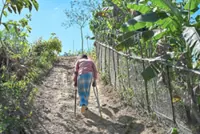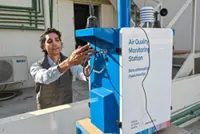Palestinian children studying in a makeshift learning centre as schools remain closed due to Israel’s ongoing bombardment in Khan Yunis, southern Gaza Strip. — Reuters
PUPILS sitting cross-legged on the sand take classes in a tent near Khan Yunis in Gaza.
Two sisters connect online to a West Bank school from Cairo.
A professor in Germany helps Palestinian students link up with European universities.
After watching their schools and universities be closed, damaged or destroyed in more than seven months of relentless Israeli assault, Gazans sheltering inside and outside the territory are doing what they can to restart some learning.
“We are receiving students and we have a very large number of them still waiting,” said Asmaa al-Astal, a volunteer teacher at the tent school near the coast in al-Mawasi, which opened in late April.
Instead of letting children lose a whole year of schooling as they cower from Israeli bombardment, “we will be with them, we will bring them here, and we will teach them,” she said.
Gazans fear that the battle between Israel and Hamas has inflicted damage to their education system – a rare source of hope and pride in the enclave that will outlast the fighting.
Gaza and the occupied West Bank have internationally high literacy levels.
But Israel’s blockade of the coastal Palestinian enclave and repeated rounds of conflict have left education fragile and under-resourced.
Since the war began on Oct 7, schools have been bombed or turned into shelters for displaced people, leaving Gaza’s estimated 625,000 school-aged children unable to attend classes.
All 12 of Gaza’s higher education institutions have been destroyed or damaged, leaving nearly 90,000 students stranded.
More than 350 teachers and academics have been killed, according to Palestinian official data.
“We lost friends, we lost doctors, we lost teaching assistants, we lost professors, we lost so many things in this war,” said Israa Azoum, a fourth-year medical student at Gaza City’s Al Azhar University.
Azoum is volunteering at Al Aqsa hospital in the town of Deir al-Balah to help stretched staff deal with waves of patients but also because she doesn’t want to “lose the connection with science”.
“I never feel tired because this is what I love doing. I love medicine, I love working as a doctor and I don’t want to forget what I have learnt,” she said.
Fahid Al-Hadad, head of Al Aqsa’s emergency department and a lecturer at the faculty of medicine at the Islamic University of Gaza (IUG), said he hopes to start teaching again, though he had lost books and papers accumulated over more than a decade when his home in Gaza City was destroyed.
Online instruction will be complicated by weak internet but could at least allow students to complete their degrees, he said.
The buildings of IUG and Al Azhar stand badly damaged and abandoned on neighbouring sites in Gaza City.
“We are ready to give in any way but much better inside Gaza than outside. Because don’t forget that we are doctors and we are working,” Hadad said.
Tens of thousands of Gazans who crossed to Egypt also face challenges. Though living in relative safety, they lack
the papers to enrol their children in schools, so some have signed up for remote learning offered from the West Bank, where Palestinians have limited self-rule under Israeli military occupation.
The Palestinian embassy in Cairo is planning to supervise end-of-year exams for 800 high school students.
Kamal al-Batrawi, a 46-year-old businessman, said his two school-aged daughters began online schooling after the family arrived in Egyptian capital five months ago.
“They take classes every day, from 8am until 1.30pm, as if they were in a regular school. This is a lifesaving act,” he said.
In southern Gaza, where more than a million people were displaced, United Nations’ children’s agency Unicef has been organising recreational activities like singing and dancing with some basic learning.
It is planning to create 50 tents where 6,000 children will be able to take classes in three daily shifts.
“It’s important to do it but it remains a drop in the ocean,” said Jonathan Crickx, head of communications for Unicef Palestine.
Wesam Amer, dean of the Faculty of Communication and Languages at Gaza University, said although online teaching could be an interim solution, it could not provide the physical or practical learning required for subjects like medicine and engineering.
After leaving Gaza for Germany in November, he is advising students on how to match up their courses with options at universities in the West Bank or Europe.
“The challenges of the day after the war aren’t only about the infrastructure or university buildings.
“It is about the dozens of academics who have been killed in the war and the tough task trying to make up for them or replace them,” he said.
Those killed include IUG president Sufyan Tayeh, who died with his wife and all his five children in a strike on his sister’s house in December.
Tayeh, an award-winning professor of theoretical physics and applied mathematics, had a “great passion” for science, said his brother Nabil.
“Even in the middle of the war, he (Tayeh) was still working on his own research,” he said.
The UN estimates that 72.5% of schools in Gaza will need full reconstruction or major rehabilitation.
Mental health and psychosocial support will also be needed for children to “feel safe in going back to a school that might have been bombed”, Crickx said. — Reuters





